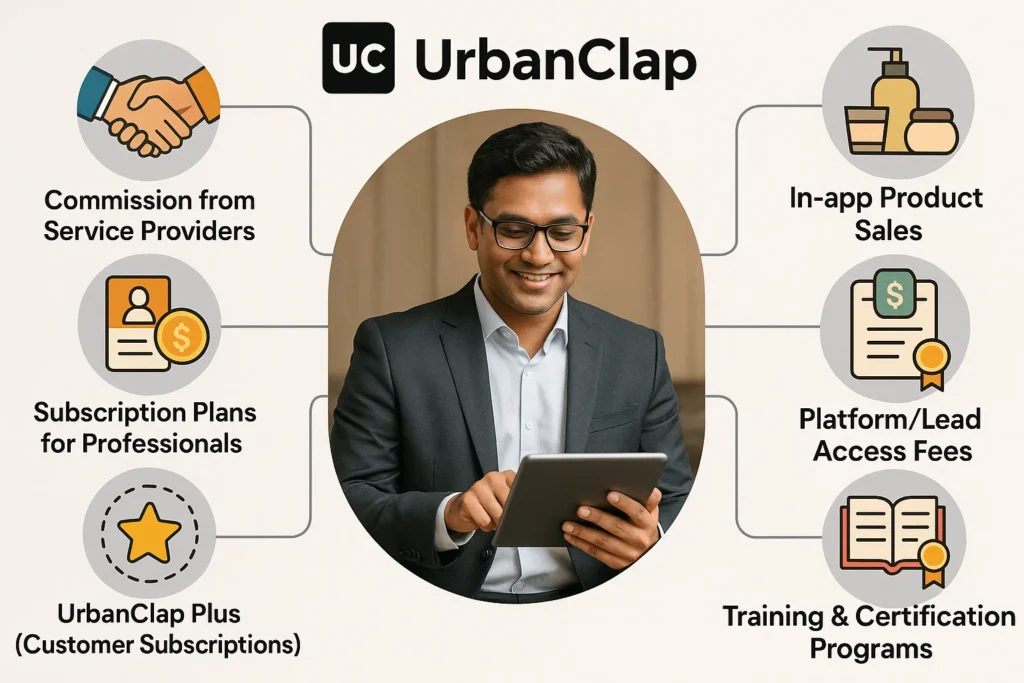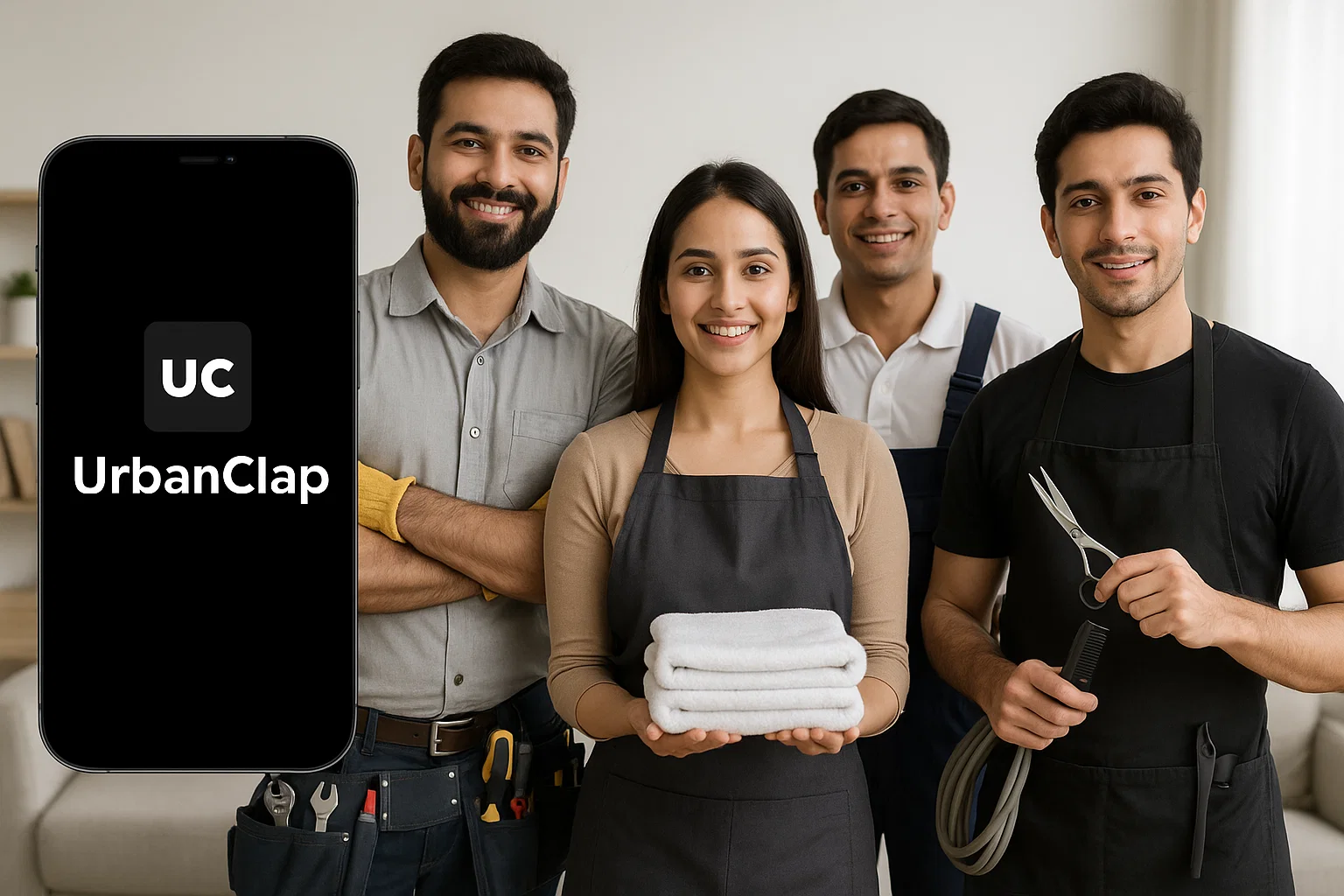UrbanClap (now known as Urban Company) has transformed the way urban consumers access at-home services — from beauty treatments and cleaning to appliance repair and fitness. What began as a small startup solving the fragmented service provider ecosystem is now a multi-city powerhouse, operating in India, the UAE, and beyond.
With millions of app downloads, thousands of trained professionals, and a trusted brand name, UrbanClap has built more than just a service booking app — it’s created a tech-enabled service marketplace with a clear path to monetization.
In this blog, we’ll break down how UrbanClap makes money, the logic behind its revenue streams, and how startups can replicate this success with a ready-made UrbanClap clone from Miracuves.
How UrbanClap Makes Money
UrbanClap operates on a service marketplace model, where it connects users with trusted professionals across multiple verticals. Its revenue strategy is multi-pronged, combining transactional income, subscription services, and platform-based monetization.
Here are the main ways UrbanClap earns money:
- Commission from Service Providers – UrbanClap takes a percentage cut from every transaction completed through the platform.
- Subscription Plans for Professionals – Service providers can opt for subscription-based plans for better visibility, leads, and tools.
- In-app Product Sales – For beauty and wellness services, UrbanClap sells branded or partner products directly to customers or professionals.
- Platform/Lead Access Fees – Professionals may pay to access premium job leads in certain categories.
- Training & Certification Programs – UrbanClap runs skill enhancement and onboarding programs that also generate revenue.
- UrbanClap Plus (Customer Subscriptions) – Customers can subscribe for perks like priority booking, discounted visits, or bundled offers.

This model is designed to scale with volume, recurring usage, and brand trust — making UrbanClap a top player in the home service tech space.
Don’t just analyze UrbanClap’s growth—take action! Learn the must-have features for a service app that will help you attract users and providers from day one.
Detailed Breakdown of Revenue Channels
Commission from Service Providers
UrbanClap charges a commission on every completed booking. The commission varies based on service type — typically ranging between 8% and 25%, depending on the category (e.g., plumbing vs. beauty). This is a primary revenue stream and aligns with the gig-economy model where the platform earns when the professional earns.
- Who Pays? Professionals listed on the platform
- Why It Scales? More bookings = more revenue, without additional operational cost
Subscription Plans for Professionals
For freelancers and businesses seeking consistent leads, UrbanClap offers subscription plans. These packages provide enhanced profile visibility, access to verified customer leads, promotional slots, and performance analytics.
- Who Pays? Service professionals looking for growth and regular jobs
- Why It Scales? Recurring income with minimal churn in popular cities
In-app Product Sales
UrbanClap offers consumables and equipment to its service partners — especially in beauty, cleaning, and spa categories. It either sells its own branded products or partners with third-party vendors for fulfillment. This not only ensures quality but also opens up e-commerce-style margins.
- Who Pays? Professionals and customers (direct and indirect sales)
- Why It Scales? Adds an e-commerce layer to a service platform
Platform/Lead Access Fees
In competitive service categories like home repair or tutoring, professionals can pay a fee to access “hot leads” — high-value or urgent jobs. This pay-per-lead model allows UrbanClap to monetize even before a booking is confirmed.
- Who Pays? Professionals bidding for jobs
- Why It Scales? Encourages healthy competition and platform engagement
Training & Certification Programs
To maintain service quality, UrbanClap provides onboarding, upskilling, and certification sessions — sometimes at a cost to the professional. This enhances brand reliability and creates an auxiliary revenue stream.
- Who Pays? New or existing professionals
- Why It Scales? Scalable training → better reviews → more bookings → more revenue
UrbanClap Plus (Customer Subscriptions)
UrbanClap has tested premium customer subscriptions under UrbanClap Plus, offering benefits like free visits, discounted pricing, loyalty perks, and bundled monthly services. This helps lock in frequent users and generates recurring revenue.
- Who Pays? Power users or regular households
- Why It Scales? Predictable revenue from high-LTV customers
Why This Revenue Model Works in 2025
UrbanClap’s monetization strategy is perfectly aligned with today’s consumer habits and tech-powered service economy. Here’s why this revenue model remains highly effective in 2025:
The Rise of the On-Demand Lifestyle
Consumers now expect everything — from grooming to repairs — to be just a tap away. UrbanClap’s transactional and subscription-based model taps into this growing preference for convenience and trust. As gig economy norms solidify, more professionals are also seeking structured platforms to earn.
Hybrid E-commerce + Service Delivery Model
By integrating product sales with service delivery, UrbanClap unlocks dual revenue streams. For instance, a beautician visit might also include the sale of a face pack or skincare kit — giving the platform additional margins without extra effort.
Recurring Revenue Through Subscriptions
Customer loyalty is monetized through “Plus” memberships, while professionals enjoy premium plans and analytics. In a post-pandemic world where hygiene and trust are paramount, both groups are more willing to pay for a curated and reliable experience.
Digitization of Informal Sectors
UrbanClap has digitized India’s fragmented home service workforce — turning unorganized, hyperlocal providers into verified professionals. The scalable nature of onboarding, training, and monetizing these workers makes this model sustainable in any metro or Tier-2 city.
AI and Smart Matching Boost Margins
By leveraging AI for lead matching, pricing optimization, and route planning, UrbanClap ensures operational efficiency. This keeps service costs competitive while maintaining healthy platform margins.
Want to replicate their success? Explore our complete guide on UrbanClap’s marketing strategy for startups and learn how to grow your business the smart way.
Can Startups Replicate UrbanClap’s Revenue Model?
Yes — and now more than ever, it’s possible for startups to replicate UrbanClap’s model without spending years on development or millions on infrastructure. But let’s be clear: building a scalable, trust-driven service marketplace from scratch is no small feat.
You’ll need:
- A seamless multi-service booking platform
- Real-time matching algorithms and provider dashboards
- Secure payments, ratings/reviews, and dispute handling
- Commission tracking, lead management, and subscription billing
- A trained, verified, and quality-controlled service partner network
That’s a heavy lift for most founders.
This is where Miracuves delivers a major advantage.
With our ready-to-launch UrbanClap Clone, startups can bypass the build-from-scratch pain and go live with a fully monetizable, customizable solution. Whether you’re targeting a specific niche (e.g., only beauty or only appliance repair) or building a full-stack hyperlocal app, Miracuves gives you the tools to:
- Charge commissions per service
- Offer pro subscriptions and premium placements
- Sell products alongside services
- Manage lead access models
- Launch loyalty or membership programs
And the best part? It’s tailored for your market, scalable from day one, and backed by a proven monetization engine.
Planning a service marketplace? Compare the best UrbanClap clone scripts in 2025, understand what the UrbanClap app is and how it works, explore our guide on building an app like UrbanClap, and check the full UrbanClap app development cost in 2025 before you start.
The UrbanClap Clone by Miracuves is priced at $2,899, designed for on-demand home and professional service businesses.
Enable easy booking, tracking, and real-time management of services.
Go live in just 3–9 days with complete source codes.
Conclusion
UrbanClap’s revenue model is a textbook example of modern marketplace monetization — blending transactional commissions, SaaS-style subscriptions, e-commerce integrations, and platform fees into one cohesive strategy. It thrives because it serves two core audiences: busy urban consumers seeking reliable services and local professionals looking for steady work and digital tools.
The beauty of this model is its scalability. Whether you’re launching in one city or ten, the same monetization levers — commissions, subscriptions, lead fees, and product sales — can drive sustainable growth.
And you don’t need to build it all from the ground up.
Build your own UrbanClap clone with a proven monetization strategy — powered by Miracuves. Get to market faster, earn from day one, and tailor the platform to your niche or region.
FAQs
How does UrbanClap generate revenue?
UrbanClap earns through service commissions, professional subscriptions, in-app product sales, lead access fees, customer memberships, and training programs. These revenue streams are built into its tech-enabled service marketplace.
Is UrbanClap profitable in 2025?
UrbanClap continues to strengthen its profitability in 2025 by expanding into new markets, boosting subscription income, and optimizing costs using AI and automation across onboarding, bookings, and logistics.
What are the main income sources for UrbanClap?
The main income sources include service provider commissions, subscription plans, sale of consumables, lead fees, and premium customer plans like UrbanClap Plus.
Can startups use the same revenue model as UrbanClap?
Yes, startups can implement UrbanClap’s model using a white-label clone solution. The key is to launch quickly, localize services, and enable monetization through a mix of commissions, subscriptions, and smart partnerships.
Does Miracuves offer an UrbanClap clone with monetization features?
Absolutely. Miracuves offers a fully functional UrbanClap Clone with built-in commission engines, subscription management, product sales modules, lead bidding, and more — all customizable to your startup needs.








